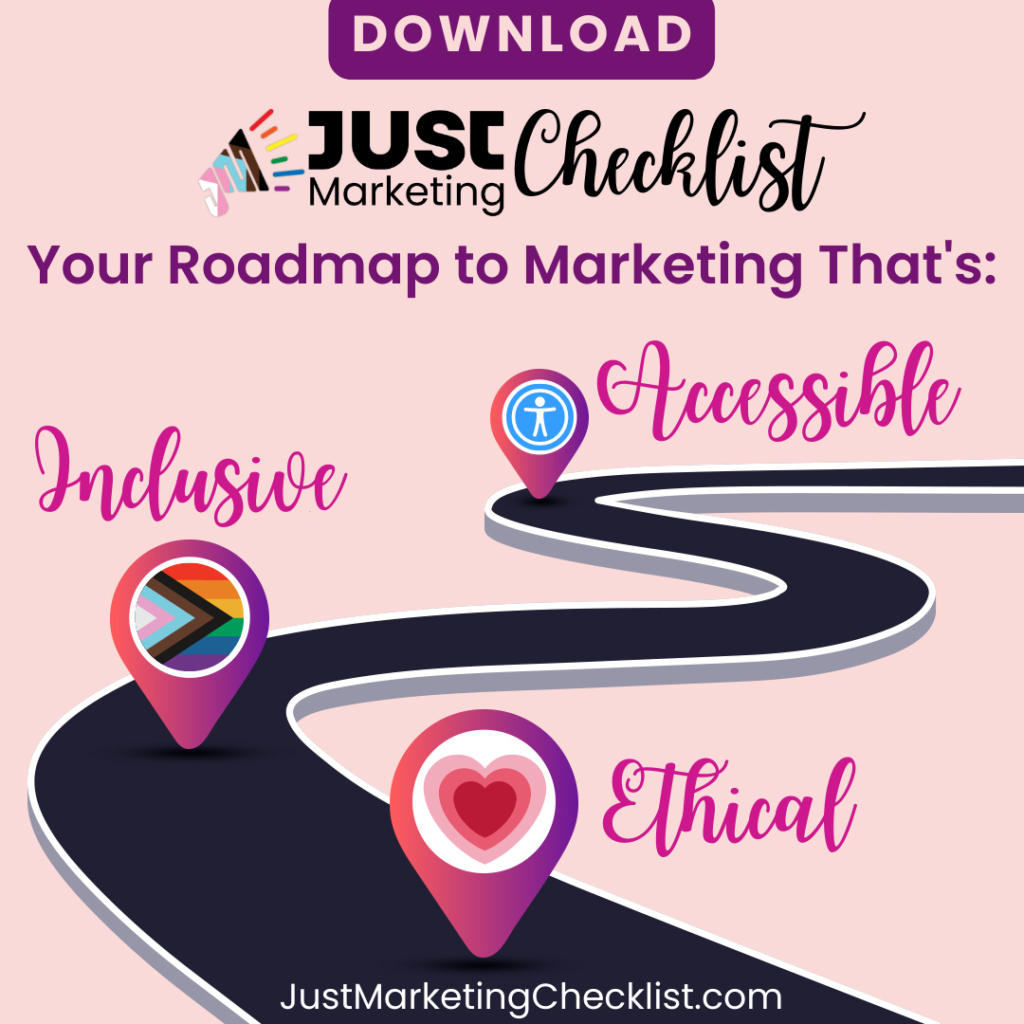In today’s fast-paced digital world, profit-driven marketing often takes center stage, promising quick wins and rapid growth. But at what cost? As consumers grow increasingly distrustful of brands using manipulative tactics, businesses are left wondering how to foster real connections while staying true to their values.
Enter Just Marketing, a people-centered approach that prioritizes ethics, inclusivity, and accessibility. It challenges the traditional profit-first mindset and instead focuses on fostering long-term relationships built on trust and respect.
This blog will explore how shifting from profit-driven to people-centered marketing not only aligns with values-driven business practices but also paves the way for sustainable success.
Ready to create a marketing strategy that feels as good as it performs?
The Problem with Profit-Driven Marketing
Profit-driven marketing is a strategy that places revenue generation above all else. While this approach might seem logical for businesses focused on growth, it often sacrifices ethical considerations, inclusivity, and trust in the process. By prioritizing short-term financial gains, profit-driven marketing overlooks the human element of business—treating customers as mere transactions rather than individuals with unique needs and values.
Key Issues with Profit-Driven Marketing
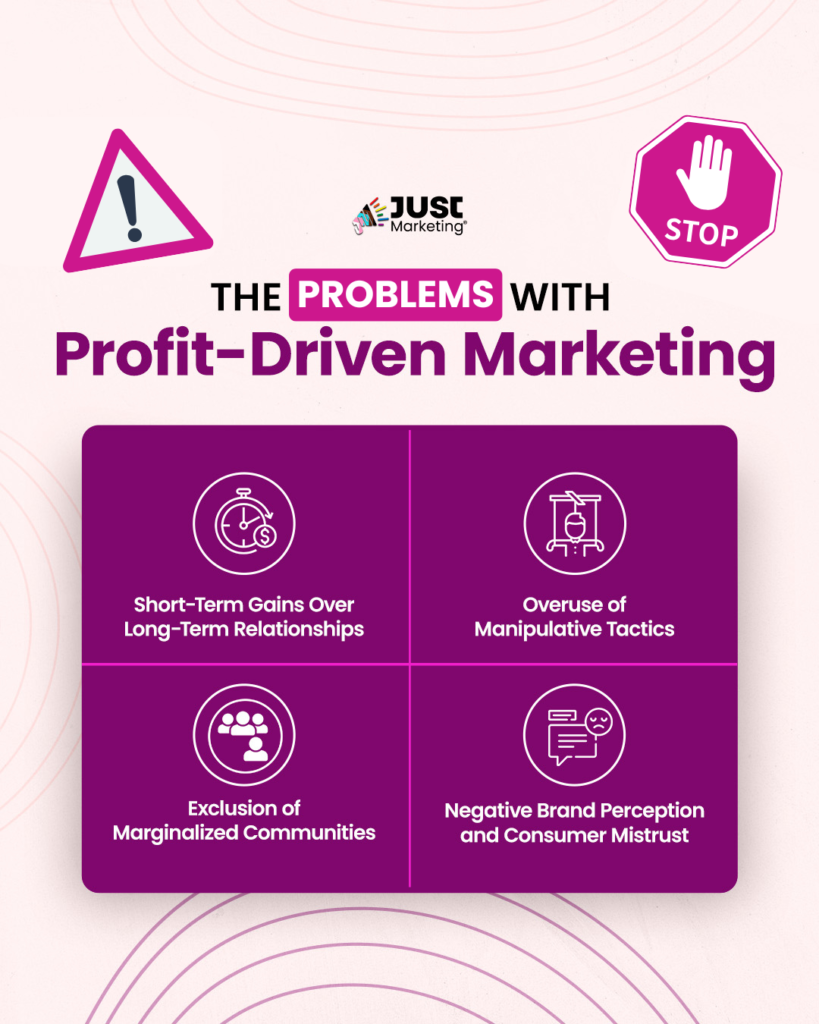
- Short-Term Gains Over Long-Term Relationships
Profit-driven marketing frequently relies on aggressive tactics to achieve immediate results. This might include pushing for high-pressure sales or prioritizing flashy campaigns that lack substance. While these efforts can deliver quick wins, they fail to build lasting connections with your audience, ultimately leading to customer churn and diminishing loyalty. - Overuse of Manipulative Tactics with Profit-Driven Marketing
Tactics such as artificial scarcity (“only 2 left in stock!”), urgency (“offer ends in 3 hours!”), and FOMO (fear of missing out) are hallmarks of profit-driven marketing. While these approaches may drive initial action, they can leave customers feeling deceived or regretful, which damages trust in the long run. - Exclusion of Marginalized Communities
When inclusivity and accessibility are afterthoughts—or completely overlooked—marketing campaigns risk alienating marginalized groups. Profit-driven strategies often prioritize a generalized, one-size-fits-all approach that neglects the unique needs of diverse communities, creating barriers that limit engagement and connection. - Negative Brand Perception and Consumer Mistrust
As consumers become more aware of manipulative and exclusionary tactics, they are quick to call out brands that prioritize profits over people. This can lead to public backlash, reputational damage, and lost opportunities for meaningful engagement with values-aligned audiences.
Imagine: A brand launches a new product with a countdown timer and promises an “exclusive, limited-time offer.” Excited by the urgency, customers rush to buy, only to discover days later that the product is still available at the same price—or worse, discounted even further. This bait-and-switch tactic leaves customers feeling cheated and hesitant to trust the brand again.
Profit-driven marketing may deliver short-term wins, but it often does so at the cost of long-term sustainability, trust, and inclusivity. The question isn’t just, “What will make the sale today?” but rather, “What will create lasting value for our audience tomorrow?”
What is Just Marketing?
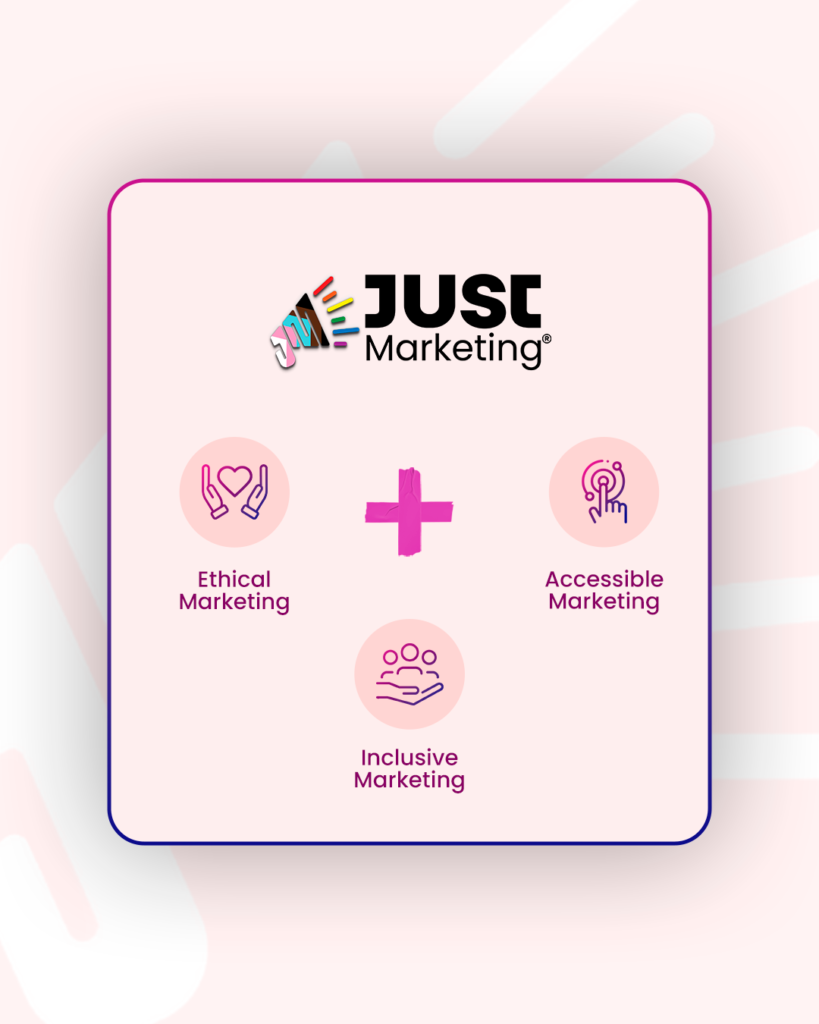
Just Marketing is an approach to marketing that reflects a deep commitment to justice. It prioritizes ethical, inclusive, and accessible practices, ensuring that every action aligns with core values of fairness, empathy, and respect. Unlike traditional profit-driven strategies, Just Marketing recognizes that kindness and integrity are not just good ethics… they’re good business.
Because kindness is a profitable marketing strategy.
Core Principles/Pillars of Just Marketing
1. Ethical Marketing
Ethical marketing ensures that every interaction with your audience is transparent, responsible, respectful, and fair. These four cornerstones guide decisions to build trust and authenticity:
- Transparent: Be clear and honest about what you offer, avoiding misleading or manipulative tactics.
- Responsible: Take accountability for the impact of your messaging and campaigns.
- Respectful: Value your audience’s time, intelligence, and needs.
- Fair: Ensure equitable treatment and access for all.
- Empathy ties it all together, reminding us that understanding and addressing the experiences of our audience is foundational to ethical marketing.
2. Inclusive Marketing
Inclusive marketing goes beyond token representation to create campaigns that genuinely embrace and celebrate diversity. This involves:
- Embracing Diversity: Showcase a wide range of identities, experiences, and perspectives.
- Checking Biases: Regularly review your content to identify and address implicit or explicit biases.
- Dismantling Stereotypes: Avoid oversimplified portrayals or harmful clichés.
- Being Culturally Responsive: Engage authentically with cultural nuances and contexts.
- Avoiding Appropriation: Respectfully appreciate, rather than exploit, cultural elements.
- Being Trauma-Informed: Ensure messaging is sensitive and avoids triggering or harmful language.
3. Accessible Marketing
Accessibility ensures that your marketing can be experienced and enjoyed by everyone, including individuals with disabilities. Focus on the following areas to make your content inclusive:
- Visual Accessibility: Provide alt text for images, use high-contrast designs, and ensure readability for all.
- Auditory Accessibility: Include captions and transcripts for audio or video content.
- Motor Accessibility: Design interfaces that accommodate a range of physical abilities.
- Cognitive Accessibility: Simplify navigation and content to support diverse cognitive needs.
Just Marketing doesn’t just make your business more ethical—it also makes it more effective. By centering your strategies on justice, ethics, inclusivity, and accessibility, you’re not only building trust and loyalty but also differentiating your brand in a way that profit-driven competitors can’t replicate.
Making the Shift to Just Marketing
Transitioning from a profit-driven mindset to a people-centered approach isn’t an overnight process, but it’s a worthwhile investment for both your business and your audience. Here’s how you can start embracing Just Marketing principles today:
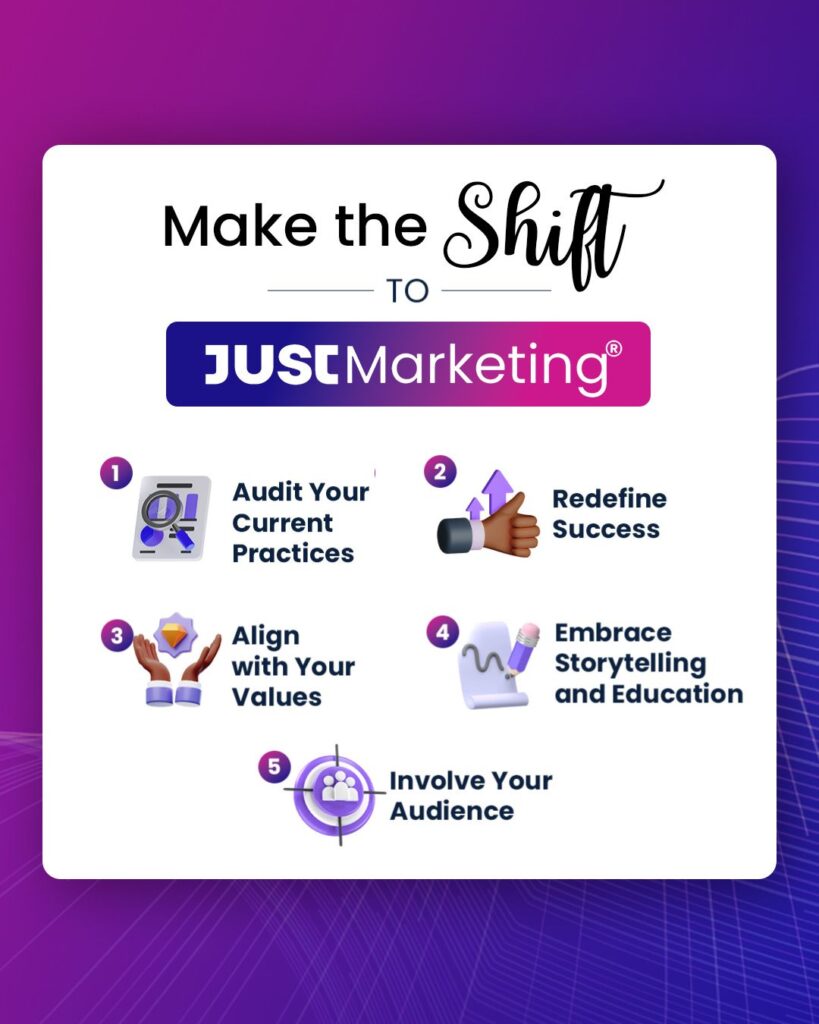
Step 1: Audit Your Current Practices
Take a hard look at your existing marketing strategies to identify areas where profit-driven tactics might overshadow people-centered ones.
- Ask Yourself: Are you prioritizing quick sales over building relationships?
- Evaluate:
- Ethics: Are your campaigns honest and respectful?
- Inclusivity: Does your content resonate with a diverse audience?
- Accessibility: Is your marketing easily understood and navigable by people of all abilities?
By recognizing gaps and areas for improvement, you’ll create a clear starting point for change.
Step 2: Redefine Success
Success in Just Marketing goes beyond revenue metrics. It focuses on the impact your business has on people and communities.
- Shift Your Focus:
- From click-through rates to meaningful engagement.
- From sales numbers to building trust and loyalty.
- From profits to creating positive change.
- Consider measuring metrics like community involvement, repeat customers, and feedback from your audience.
Step 3: Align with Your Values
Your marketing should reflect the values that matter most to you and your brand.
- Incorporate Values into Decisions: Use your ethical principles as a filter for all marketing efforts, ensuring that campaigns align with inclusivity, accessibility, and fairness.
- Be Vocal: Share your commitment to ethical practices with your audience. Transparency about your values fosters trust and encourages accountability.
Step 4: Embrace Storytelling and Education
People-centered marketing thrives on connection. Instead of focusing solely on selling, use your platform to share stories and educate your audience.
- Tell Stories: Highlight real experiences—your own or those of your customers—that demonstrate your brand’s impact.
- Educate: Offer actionable advice, resources, or insights that genuinely help your audience.
By shifting the narrative from “Look what I’m selling!” to “Here’s how I can help,” you’ll create deeper connections with your audience.
Step 5: Involve Your Audience
Your audience is one of your greatest assets in the journey toward Just Marketing. By seeking their input, you can ensure your efforts resonate and include diverse perspectives.
- Gather Feedback: Ask for opinions, especially from individuals in marginalized or underserved communities.
- Act on Insights: Use the feedback to refine your campaigns and ensure they’re accessible and inclusive.
Engaging your audience in the process doesn’t just enhance your marketing—it strengthens your relationship with the people you serve.
By taking these steps, you’ll begin to transition from a profit-driven approach to a people-centered one that aligns with your values, builds trust, and fosters sustainable growth.
Benefits of Just Marketing
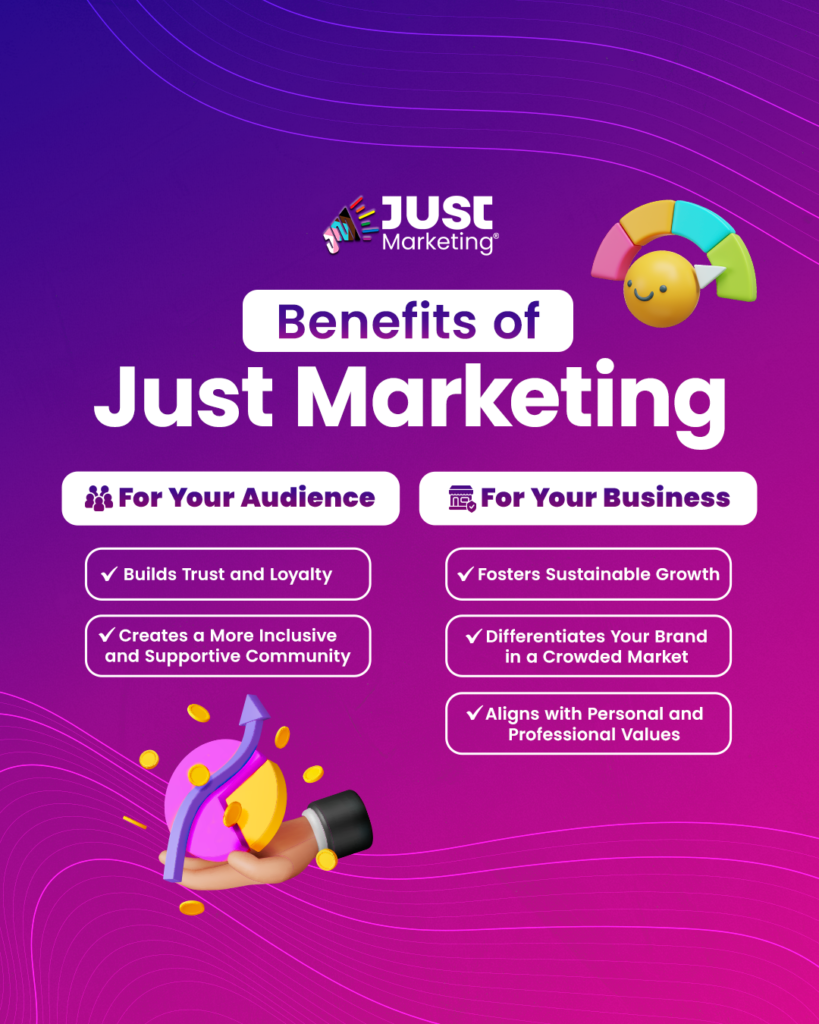
Making the shift from profit-driven to people-centered marketing is not just a feel-good decision—it’s a strategic one that benefits both your audience and your business.
For Your Audience For Your Business Builds Trust and Loyalty
When your marketing prioritizes honesty, inclusivity, and accessibility, your audience feels seen, valued, and respected. This fosters trust, which translates to long-term loyalty.Fosters Sustainable Growth
People-centered marketing prioritizes building relationships over chasing quick sales. This creates a foundation for sustainable growth through repeat customers, referrals, and positive word-of-mouth.Creates a More Inclusive and Supportive Community
By embracing diversity and removing barriers to engagement, you cultivate a community where everyone feels welcome and empowered to participate. This inclusivity creates stronger, more meaningful connections.Differentiates Your Brand in a Crowded Market
In a world saturated with profit-driven tactics, a commitment to Just Marketing sets your brand apart. Being known for your values, authenticity, and commitment to justice makes your business memorable and compelling.Aligns with Personal and Professional Values
Operating in alignment with your values doesn’t just feel better—it leads to better decision-making and greater satisfaction. Knowing that your business contributes positively to the world enhances both your professional and personal fulfillment.
By adopting Just Marketing, you’re creating a win-win situation: your audience experiences authentic, inclusive, and supportive engagement, while your business thrives in a way that aligns with your values and vision for the future.
Next Steps
The journey from profit-driven to people-centered marketing is not without its challenges, but the rewards far outweigh the effort. By prioritizing ethics, inclusivity, and accessibility, you’re not just creating better marketing—you’re fostering trust, building meaningful relationships, and contributing to a more just and equitable business landscape.
It’s important to remember that this shift takes time. Change is a process, and every small step you take toward embracing Just Marketing principles brings you closer to your goals of sustainable growth and deeper connections with your audience.
Begin by conducting a quick audit of your current marketing practices. Ask yourself:
- Are you prioritizing short-term wins over long-term relationships?
- Are your campaigns accessible, inclusive, and aligned with your values?
Taking this first step can illuminate where you’re already succeeding and where you have room to grow.
Want more support?
Download the Just Marketing Checklist to guide you through the content creation process and create a strategy that feels as good as it performs.
